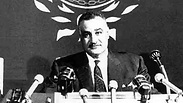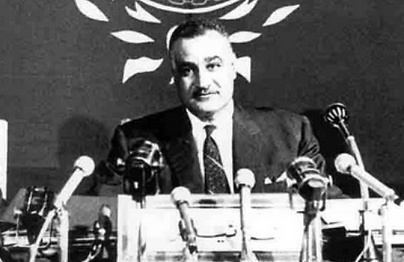
and Egyptian President Gamal Abdel Nasser
Mossad listened in on Arab states' preparations for Six-Day War
King Hassan II of Morocco, who didn't trust his guests from the Arab League, secretly recorded the discussions at a 1965 summit. It was the information mined from these recordings—that the king gave the Israeli Mossad—which helped the IDF prepare for the war to come some two years later.
The Mossad was able to gain access to the secret recordings of a conference Arab nations had held to prepare for a possible conflict with Israel, significantly helping the IDF prepare for what went on to become the Six-Day War, former Military Intelligence chief Maj. Gen. Shlomo Gazit has revealed to Ynet’s print publication Yedioth Ahronoth.
The leaders of the Arab world at the time, along with their military commanders and the heads of their intelligence services, convened at a luxurious hotel in Casablanca, Morocco in September 1965 to discuss one main question: whether they were prepared for war against Israel.
Under great secrecy and tight security, the Arab leaders were debating whether to establish a joint Arab command for such a possible war. Their military commanders presented a plethora of information about the order of battle, speaking openly and with relative candor about the capabilities of the militaries under their command.
Alongside the agreement that they must prepare for the coming war with Israel and that such a war would have serious ramifications for the Arab world, there were also many disagreements among the participants. Jordan's King Hussein and Egyptian President Gamal Abdel Nasser got into heated arguments over differences of opinion.
It was King Hassan II of Morocco, who did not really trust his guests, who allowed the Mossad to closely monitor the conference.
A team from the “Birds” (tziporim in Hebrew) unit—a joint team headed by Peter Zvi Malkin and Rafi Eitan consisting of the Shin Bet, Israel’s internal security service, and the Mossad—arrived in Casablanca, where the Moroccans closed off an entire floor of the hotel for them.
A day before the conference began, however, King Hassan ordered the Mossad agents to leave the hotel because he was worried Arab guests would notice them.
"But immediately after the end of the conference, (the Moroccans) gave us all of the needed information, and didn't deny us anything," Rafi Eitan recounted.
The recordings of all of the conference’s discussions—recorded without the participants’ knowledge—were given over to the Military Intelligence Directorate's Research Department, where they were decrypted, transcribed, and translated into Hebrew. They provided an unprecedented look into the behind-the-scenes workings and mindset of the enemy's leadership.
In a memo to then-Prime Minister Levi Eshkol, the Mossad chief at the time, Meir Amit, described the operation as "one of the crowning glories of Israeli intelligence."
Israel prepared for the Six-Day War based on the vast amount of intel produced from these recordings, and the IDF's commanders were confident they could win.
"These recordings, which were truly an extraordinary intelligence achievement, further showed us that, on the one hand, the Arab states were heading towards a conflict that we must prepare for. On the other hand, their rambling about Arab unity and having a united front against Israel didn't reflect real unanimity among them," said Maj. Gen. Gazit, who was at the time the head of Military Intelligence’s Research Department.
Thanks to the recordings, alongside other sources, "we knew just how unprepared they were for war," Gazit continued. "We reached the conclusion that the Egyptian Armored Corps was in pitiful shape and not prepared for battle."
Referring to Maj. Gen. Israel Tal, the commander of the IDF Armored Corps, Gazit went on to say, "Talik dismissed our opinion with scorn, saying that their situation couldn't be that grave. We later saw who was right."
The information in those recordings, Gazit said, established "our feeling, amongst the IDF's top command, that we were going to win a war against Egypt. Prophecies of doom and the feeling of imminent defeat were prevalent among the majority in Israel and the officials outside the defense establishment, but we were confident in our strength."
The Six-Day War broke out at 7:45 on the morning of June 5, 1967, with the entire Israeli Air Force bombing and strafing dozens of enemy airfields. Thanks to detailed and precise intelligence gathered in the years before the war, including from the conference’s recordings (the Mossad had even managed to get an Iraqi pilot to defect with the latest MIG-21 two years prior), Israel’s Air Force was able to destroy, within hours, nearly every fighter aircraft that Egypt, Syria, and Jordan owned. By the time the war ended six days later, Israel was occupying territories that increased its size by 300 percent. Its conquests included the Sinai Peninsula, as well as the West Bank and the Gaza Strip, with their one million inhabitants.
Gazit, who was appointed the head of Military Intelligence after the Israeli intelligence community’s failure in foreseeing Syria and Egypt’s surprise attack against Israel in October 1973, is considered one of the more prominent, level-headed intelligence officials in Israel. His remarks still garner a lot of attention, even years after his retirement.
Looking back at the Six-Day War, Gazit believes that it was actually this overwhelming victory that had hidden within it the seed of destruction, caused by the Israeli public’s move towards the extreme right since.
In recent conversations, he slammed the Gush Emunim movement that was created to establish Jewish settlements on the land that was conquered in that war: "These fanatics are saying, 'If I have to be in a conflict between my religious beliefs and the mission God gave me—settling the land—and the (laws set by the) Israeli government, then God comes first.'"
He also issued a dire warning: "It's been almost 50 years since the Six-Day War and we are still in the process of looking for a solution and a way out of the outcomes of that war. Looking back, this is probably the second most important war Israel fought, after the War of Independence in 1948. The victory in the War of Independence allowed us to establish the state; the victory in the Six-Day War might bring an end to the Jewish and democratic Israel."












